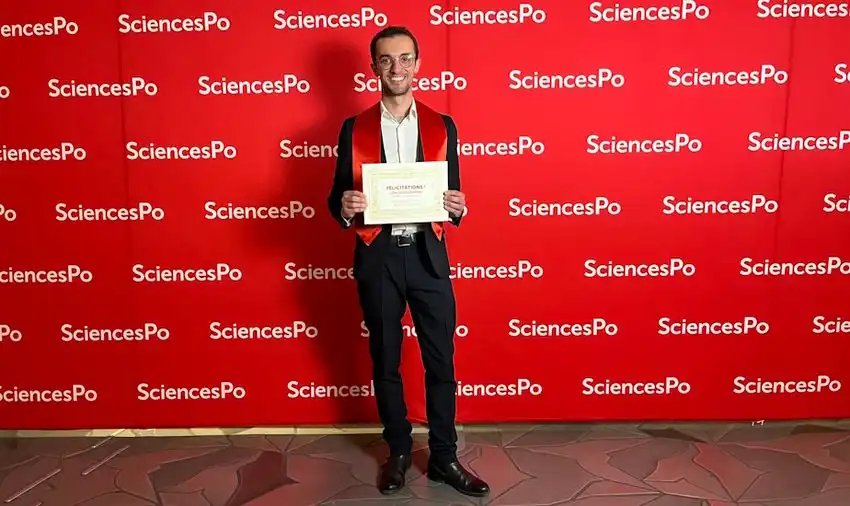Home>Gender Studies: Mickael, Challenging Gender Norms
27.11.2023
Gender Studies: Mickael, Challenging Gender Norms
Initially aspiring to become an English teacher, Mickael Raggi finally branched off into the social sciences, more particularly international affairs.
He graduated from Sciences Po with a master’s degree in Human Rights and Humanitarian Action from our Paris School of International Affairs (PSIA), accompanied by the Advanced Certification in Gender Studies and the Gender Equality and Public Policy Certificate (in French), two certificates offered by Sciences Po's Gender Studies department (PRESAGE).
Let's meet this graduate.
WHY DID YOU CHOOSE TO PURSUE AN EDUCATION IN GENDER STUDIES?
The decision to pursue the Advanced Certification in Gender Studies in tandem with my Master's degree in Human Rights, was born out of a deep commitment to understanding the complexities of gender, sexual orientation, and their significant influence on our society and human rights. Early in my studies, it became clear how gender and sexual orientation influence our societies and lives at every level. These dynamics don't just shape individual identities; they are interwoven into the fabric of our societies, informing power dynamics and laying the groundwork for numerous pressing human rights issues.
Contrary to the common misconception that gender studies is primarily a concern for women, I ardently believe that it holds relevance for everyone. Gender norms and stereotypes cast a wide net, impacting individuals across all gender identities. As a man, I recognise the privileges I hold, yet I am also critically aware of the constraints and expectations societal norms enforce. These norms and stereotypes bear a disproportionate impact on women and individuals of diverse sexual orientations, often leading to widespread discrimination and violence.
My interest in gender studies is driven by the ambition to understand and challenge these structures, to dismantle harmful biases, and to appreciate the diversity of human experiences. The journey has been transformative, revealing the complexities of societal norms, the resilience of those who defy them, and the necessity of empathetic understanding. Overall, this certification was not just an academic pursuit, but a pledge – a pledge to use the insights I've gained to challenge prevailing norms, to champion empathy and understanding, and to strive towards a world where dignity is not dictated by gender or sexual orientation.
IS THERE A PARTICULAR GENDER STUDIES CLASS THAT MOVED YOU?
Last semester I had the opportunity to take the course “Feminist Foreign Policy: How to Fight for Gender Equality in International Relations'' taught by French Ambassador Delphine O and French Diplomat Margaux Bonnet. It opened my eyes to the transformative potential of feminist foreign policy, threading together the complex international relations tapestry with an in-depth focus on gender issues. It wasn't just the theories and principles behind such policies that were enlightening, but the real-world case studies from countries like Sweden, Canada, France, and Mexico… which added a palpable sense of reality to our discussions. The firsthand insights offered by guest speakers, all key players in the creation and execution of feminist foreign policies, underscored the profound, tangible impact these strategies can have on a global scale.
What I found incredibly effective about the course was its commitment to grounding the principles of feminist foreign policy in practical, implementable strategies. Indeed, the strategic simulation exercises, the analysis of international treaties and agreements, the critical examination of global events through a feminist lens – all of these elements served to develop our skills for real-world application. This transformative experience was further amplified by the hands-on assignments, revolving around a simulation of the Generation Equality Forum (GEF), which thrust me into the epicentre of global gender equality initiatives. These assignments reflected real-world challenges in international relations, offering invaluable insights. The opportunity to "walk in the shoes" of decision-makers, to navigate intricate negotiations, align differing viewpoints, and formulate a unified strategic vision was truly inspiring and will shape my perspective and approach in my future career significantly. Thank you Delphine and Margaux for a brilliant course which has endowed me with a powerful framework to scrutinise international relations and instilled an urgency to advocate for gender equality on a global scale! I feel equipped and motivated to take this learning forward, to utilise it in my professional pursuits, and, in doing so, contribute to a more equitable world.
WHAT ADVICE WOULD YOU GIVE TO THE NEXT COHORTS?
Embrace the diversity of perspectives with open minds, challenge your own preconceptions persistently, and remember that understanding complex issues like gender and human rights is a journey that requires continuous learning and empathy.

